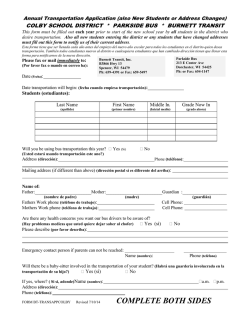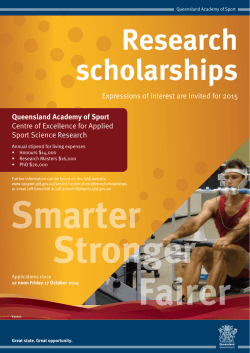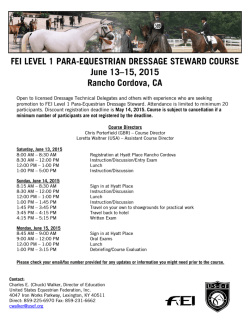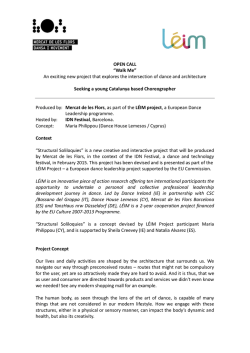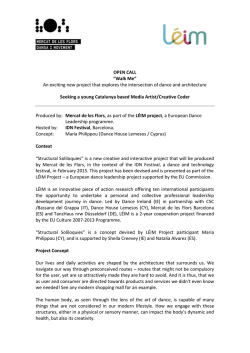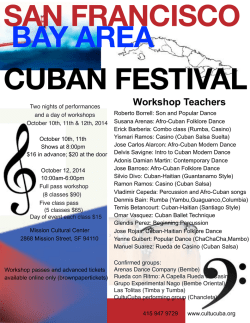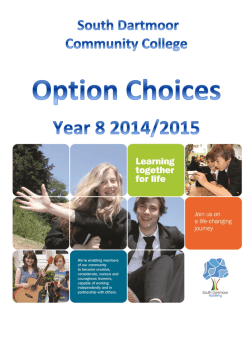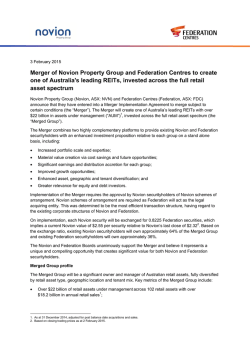
Pathway to Futures 2015
Parkside Federation Academies Pathway to Futures Key Stage 4 Information for 2015 INFORMATION AND COUR SES FOR SEPTEMBER 2015 Aims of the Key stage 4 Curriculum The Parkside Federation Key Stage 4 curriculum aims to develop successful, enquiring, knowledgeable and caring young people with an internationally minded approach to life. The subjects offered and the time we allocate to these reflects local and national priorities. At Key stage 4 we are proud of our success in securing students onto the post 16 route of their choice. At the heart of our design of the Key stage experience are the principles of academic achievement, breadth and balance. We know that this approach is valued by employers and higher education, as well as by our families and students. We aim to provide every student with a clear sense of purpose as they embark on their KS4 programme of study. We know that when students see their study as a step in achieving future goals this encourages motivation and determination. Throughout year 9, and into year 10 and 11 there is a defined, continuous process that encourages every individual to explore their pathways into future study and careers. How we prepare students for the future Careers, Information, Advice and Guidance This booklet introduces the first stage in a very extensive and supportive programme of preparation for choosing the most relevant and appropriate career and study paths post 16. These are the main steps in this process: • Lessons in PSHE where students begin to explore their personalities, interests and attributes, matching these to potential areas of work and study. • A visit to Anglia Ruskin, so that students gain first-hand experience of what it is like to be at University – this is called ‘Eyes on the Prize’. • An information evening in January, where teachers from every subject studied by students in Key Stage 4 are available to talk with students and families. • Optional parent meetings are available to discuss ‘the future’ with tutors and clarify any concerns, as well as discuss and confirm the subject(s) selected as additional choice GCSEs. • A Year 10 Careers event during the CAS week in July where students spend time with a range of local Employers and Universities finding out about the general processes of applying and preparing for work and study interviews. • A Year 11 programme of support to select, apply and prepare for post-16 courses and work. Via the CAP application process. The Curriculum - (see the diagram on the following page.) Students study a programme of core GCSEs to prepare them for life beyond school. This provides the important foundation needed to ensure that skills for work and further study are secure. Good grades rather than large quantities of subjects are the key. We have designed a programme of 9 GCSE subjects with the lesson time required to maximise learning in each of these. The majority are subjects that all students need to study, called the 2 Parkside Federation Curriculum KS4 core. They include English (Literature and Language) and Maths, Science, French or French and Spanish, and Geography or History. Sport and PSHE are also studied along with an additional subject chosen from 16 potential BTEC or GCSE subjects. The benefits of specialist facilities on one or other of the two sites and the larger student numbers associated with our Federation of school allows us to offer a large range of these additional subject choices. The additional subject allows students to follow areas of particular personal interests. In exceptional cases there may be an opportunity to study more than one subject if a student really feels that they have the time and capacity to do this. This should be negotiated on an individual basis and will depend on availability of places once every student has selected their first choices. Future Pathways For those students who wish to progress onto post 16 study (whether that is IB, A level, or Level 3 Applied learning) the skills and knowledge acquired through the study of English, Maths, Science, a foreign language and a humanities subject are fundamental. This suite of subjects is highly valued by sixth forms, Universities and employers. For learners who wish to follow more practical or technically based careers, for example, in the ‘Trades’ or Retail, the core subjects are equally important. Strong literacy and numeracy skills, reinforced by study in Geography or History are important requirements for future employability, and a background in Science is vital in our technological age. These subjects provide a firm foundation to progress to training with employment, or onto a full vocational programme (e.g. mechanics) at a Further Education College, such as Cambridge Regional College. The Wider Curriculum Sport and PSHE Every student should participate in health-promoting physical activity. For all students this is achieved through attendance on the compulsory Core Sport programme for 2 lessons. Similarly, to ensure that students develop an understanding of the world beyond academic study, every individual will study PSHE (Personal, Social, Health and Employment) topics for two lessons a week (for those taking French with Spanish, this will be covered in one of these languages). Extra- Curricular The range of Parkside Federation extra curricular opportunities is enormous, from clubs and home language or Latin GCSEs, to subject talks, school trips and CAS activities. This learning offers the opportunity for pursuing personal interests and goals. Participation in these activities is a highly important aspect of school life which is recognised and valued by future employers and post 16 institutions. This learning forms an essential element of every student’s portfolio of experiences whilst at school. Time to engage in the programme of activities should be planned for when students embark on their Key Stage 4 courses. Parkside Federation Curriculum KS4 3 The Curriculum Pro gramme 2015 – 2017 Core Core Core Core Science Core Languages Core Humanities PSHE and Sport non examination English Language and English Literature Maths Biology, Chemistry and Physics French and Spanish or French Choice of History, Geography or Ancient History One additional subject from: Individuals and Societies Ancient History Business Geography Health and Social Care History Religious Studies Creative and Physical + + + + + + Art Dance Drama Film Music Sport Technical and Technology Construction Hospitality/Catering Product Design Computing Approx. 3.5hrs 4 lessons Approx. 4hrs 5 lessons Approx. 4hrs 5 lessons Approx. 5hrs 6 lessons Approx. 3.5hrs 4 lessons Approx. 2.5hrs 3 lessons Approx. 2.5hrs 3 lessons Total 25hrs 30 lessons Extra curricular Latin is available. 4 Parkside Federation Curriculum KS4 Parkside Federation Curriculum KS4 5 ENGLISH LITERATURE What you will study: What you will study: You will study a range of literary fiction and non-fiction texts, examining how writers build up description for effect in their writing, and how writers convey their viewpoint persuasively. Additionally, you will develop your skills in writing for different purposes: descriptive, argumentative, and persuasive writing to name a few. Accuracy in spelling, punctuation, and grammar will continue to be a key focus. In English literature, you will develop your analytical ability and essay writing skills through the study of your set texts. These include: a Shakespeare play, a nineteenth-century novel, a modern novel or drama text, and poetry. You will need to consider how the writers have used literary devices for effect by closely focusing on key words, elements of structure, and other techniques that they have incorporated into their works. Assessment: Assessment: In this linear qualification, all examinations will take place at the end of Y11. You will sit examinations in both reading and writing where you will need to analyse and respond to a range of texts, as well as compose your own writing pieces. You will undertake a separate endorsement for Speaking and Listening, which does not count towards your final GCSE grade. This is a linear qualification, so all examinations will be sat at the end of Y11. Students are required to respond to their set texts through extract questions, and essay questions based on the entire work. There is also an ‘unseen’ element, where students respond to a poem that they have not studied before. 6 Parkside Federation Curriculum KS4 Core Subject Core Subject ENGLISH LANGUAGE Parkside Federation Curriculum KS4 7 Core/Additional Subject Core Subject MATHEMATICS SCIENCE What you will study: What you will study: Students will learn the use and apply mathematical concepts in a range of situations, some of which combine the need for functional skills. Students will develop their understanding of mathematical concepts through exploration, investigation and reasoning. They will have frequent opportunities to challenge and question mathematical ideas to deepen understanding of when and how the knowledge and skills that they develop can be applied. Students will be well prepared for using mathematics within other academic or vocational subjects along with real life and practical situations. You will learn about some of the more scientific principles and explanations, for example the history of planet Earth, how healthy our lifestyles are, and how we use scientific knowledge to find ways of controlling air pollution. You will develop a greater understanding of the world around you, how to gather and interpret data, think logically, and communicate clearly and carefully. These are all valuable skills, which are needed in many walks of life. Assessment: The course is assessed by taking two written papers, Paper 1 and Paper 2. Paper 1 is a non-calculator paper, but students are allowed to use a calculator for Paper 2. For this linear course students will be assessed at either Foundation (up to grade C) or Higher Tier (grade D and above). Each student’s needs will be considered when deciding when and at what tier they should be assessed at. Students will be taught in groups containing students working towards the same tier of assessment. 8 Parkside Federation Curriculum KS4 Assessment: Students will be offered the opportunity to take Edexcel Level 2 Certificate Triple Science, OCR 21st century Triple Science or Core/Additional Science A (two GCSEs). Students will be informed of their recommended level of study by the Science Faculty based on Year 9 test results. Parkside Federation Curriculum KS4 9 ANCIENT HISTORY - GCSE Core Humanities Core Subject FRENCH French and Spanish What you will study: What you will study: French All students study French (except in exceptional cases). The course develops students’ language in the four key skills of listening, reading, writing and speaking. Students learn about the grammar; vocabulary pertaining to daily life and beyond; and the culture surrounding countries with French as a language. Students are encouraged to engage in independent enquiry and to be creative communicators in their use of the French language. French and Spanish For the highest achieving language students (selected through assessment) there is the opportunity to study French and Spanish. Assessment: Students will be assessed in exams which focus on Speaking, Listening and Reading and Writing. 10 Parkside Federation Curriculum KS4 Study two of the great civilisations of ancient times - the Greeks and the Romans. Ancient History GCSE provides an introduction to the ancient world. It gives you the opportunity to study some of the most fascinating characters in western history. These are the men and women who have helped to shape the way we see the world, and whose lives have a strong relevance to the modern world. The sources for these characters contain many interesting stories, but the task of the ancient historian is to study these stories and to try and think carefully about the meaning of each source, and to work out a logical conclusion. The course encourages the disciplined creativity that is so essential for a historian, and which can be applied in all areas of later life. Topics • UNIT 1 The Greeks at War – The Greeks defend themselves • UNIT 2 The Rise of Rome – The Origins of Rome: The Kings • UNIT 3 Women in Ancient Politics – Cleopatra and her impact on Roman politics • Case Study – One of – Ancient Egypt, Ancient Crete, Troy and the Mycenaeans, Ancient Persia, The Hellenistic world, The Celts Assessment: Assessment includes the final examination: 3 final written papers, each 1 hour long. The case study is completed in lessons in Y11. Parkside Federation Curriculum KS4 11 Core Humanities Core Humanities GEOGRAPHY HISTORY What you will study: Challenges of Living in a Built Environment - You will study cities and their growth and compare quality of life for different community groups. We look at the work of town planners and pressure groups, as well as the patterns of services such as shopping, transport and leisure in cities such as Glasgow, London, and Rio de Janeiro and Cambridge. People and the natural world - As well as studying climate and weather, at national and global scale, you will look at how people’s activities affect and are affected by the weather and climate. We’ll follow hurricane and other weather events such as El Nino. We will look at major world environmental issues like rainforest clearance, acid rain and desertification. You will look at the way people manage rivers and coasts as well as landforms. We will discuss issues like flood control and drought management. We will visit the Norfolk coast for fieldwork at the end of Year 10. People, Work and Development - You will be looking at work opportunities in different parts of the world, how different economic activities damage the world and how international trade and aid operates. Assessment: Case Study knowledge based exam, as well as a Decision Making skills base paper, together these account for 80% of the final mark. Extended coursework task based on fieldwork referred to above, accounts for the remaining 20%. 12 Parkside Federation Curriculum KS4 What you will study: Germany 1918-1945 - The aim of this study is to encourage students to develop and enrich their understanding of people and problems in the past through the social, political and cultural changes that occurred in Germany between the two World Wars. Topics include Hitler’s rise to power, Nazi policies of control using fear and propaganda, opposition to the Nazis and The Holocaust. Medicine Through Time - This study is designed to examine continuities and changes in the history of medicine, and the factors that underpin social change, medical evolution and scientific revolution. Students’ research how new ideas concerning medicine were discovered, and which individuals took the credit. Modern World Study - We will examine the difficulty in finding a peaceful settlement to the Arab-Israeli conflict over land in the Middle East. The study examines the religious and historical causes of the conflict and the attempts at a peaceful resolution in the Twentieth and Twenty-first Century. Assessment: Paper 1: Germany. Paper 2: Development in Medicine Controlled Assessment. Parkside Federation Curriculum KS4 13 HEALTH AND SOCIAL CARE Individuals & Societies Individuals & Societies BUSINESS STUDIES What you will study: What you will study: This course is ideal for those who have a natural interest in how businesses work and who maybe one day wish to set up their own business (or just be on Junior Apprentice!). You will acquire knowledge of the business world and some of the practical skills much valued by employers. You will study three units over the duration of the course. Marketing and Enterprise Business and People Production, Finance and the External Business Environment Assessment: A case Study, knowledge based exam for Production, Finance and External Business Environment as well a Business and People exam account for 75% of the final mark. An extended coursework task based on a marketing and enterprise scenario accounts for the remaining 25%. 14 Parkside Federation Curriculum KS4 Health and Social Care Values – In this unit learners will gain an understanding of how values are applied in health and social care settings and their importance for professionals in the sector. Human Lifespan Development – This unit provides learners with the opportunity to explore how we grow and develop throughout our lives and to investigate the factors that affect this growth and development. Effective Communication in Health and Social Care – Communication skills are vital for those working in health and social care. This unit will allow learners to investigate different forms of communication and how they are used effectively. Equality and Diversity – We live in a multi-cultural society. In this unit learners will explore the importance of non-discriminatory practice in health and social care. Healthy Living – Health and wellbeing are influenced by a range of biological and lifestyle factors. This unit gives learners the opportunity to explore how healthy and unhealthy lifestyles choices impact in health and well-being. Creative and Therapeutic Activities in Health and Social Care – This unit explores the use of art, music, drama and complementary therapies in the promotion of health and well-being. Assessment: Learners are assessed by a mix of internal (75%) and external assessment (25%). Internal assessment is teacher-led with assignments devised, set and marked by your teachers. The remaining two units are externally set examinations. Learners are graded Pass, Merit or Distinction for each unit which is combined to give an overall grade P, M, D, D* (equivalent to two GCSE’s A* - C). Parkside Federation Curriculum KS4 15 Creative and Physical Individuals & Societies RELIGIOUS STUDIES ART What you will study: The GCSE Religious Studies course looks at philosophical and moral questions. It makes no difference whether you come from a religious background or have no experience of religion at all. These are the topics covered. A.Religion and Morality (Unit 3) For each topic, the legal and/or social issues connected to it, including nonreligious view points, are covered. Topics include: Medical Ethics; Attitudes to The Elderly and Death; Drug Abuse; Crime and Punishment; Rich and Poor in Britain; World Poverty. B.Religious Philosophy and Ultimate Questions (Unit 4) This unit is intended to begin philosophical thinking, and encourages candidates to reflect upon questions about the meaning of life, and to develop their own reasoned responses. Topics include: The Existence of God; Revelation; The Problems of Evil and Suffering; Immortality; Miracles; Science and Religion. Assessment: Each module is examined by a written exam in which skills of knowledge, understanding and evaluation are shown. There is no coursework. 16 Parkside Federation Curriculum KS4 What you will study: • • • • Work in pencil, paints, collage, ink, mixed media, oil pastel, mono print, lino print, dry point printing, Photoshop work, clay, wire, and card. Work from observation and imagination whilst investigating the work of other artists, evaluating their techniques and analysis of how you could develop your own work as a result of looking at them. Have the chance to experience a number of local and national trips and potentially take part in foreign trips during the summer term of Year 10. You must be committed to working independently. Assessment: The course does require written analysis, and evaluation. There is an emphasis on supporting studies: 75% of the marks for each project comes from research, recording observations, developing ideas, analysing the work of other artists and showing evidence of experimenting with materials. The remaining 25% of the marks are awarded for the final outcomes. You must produce regular homework as part of your coursework. Each home learning task lasts a minimum of 2 hours. Parkside Federation Curriculum KS4 17 Creative and Physical Creative and Physical DANCE DRAMA What you will study: The course is for people who wish to deepen their knowledge, skills and understanding of contemporary dance through performance, composition and appreciation. You will study both theoretical and practical aspects of dance, being given the opportunity to watch many dance pieces that you will analyse and base your own practical work upon. You will participate in practical dance lessons every week (focusing on contemporary style), which will increase your technical skills and your creativity. There will be opportunities for you to choreograph your own pieces too. Assessment: 20% Written Paper 80% Practical Unit One: Critical Appreciation of Dance Unit Two: Set Dance The set dance is a practical exam. Unit Three: Performance in a duo/group Students will learn a group dance, (a group consists of between 2 and 5 people), that is based on a professional dance work. Unit Four: Choreography Task One: Solo Composition Task Two: Choreography – for a solo or group 18 Parkside Federation Curriculum KS4 What you will study: You will learn about different drama strategies and techniques, some of which you have met already in Years 7, 8 and 9 (things like role play, improvisations, movement, mime, using voice, choral speaking, using still images and thought tracking). In addition you will develop your ability to make effective use of flashbacks, parallel scenes, essence machines monologues and a range of other drama strategies. Assessment: Coursework (Practical 40%, Written 20%) 60% • Two 6 hour workshops take place and the coursework emerges as a result of this. All written work will be completed under Controlled Conditions. There is also a final performance of an extract of a play or a devised performance. Students work in groups of between 3 and 9, though they are marked individually. Parkside Federation Curriculum KS4 19 Creative and Physical Creative and Physical FILM STUDIES MUSIC What you will study: What you will study: Watch and discuss a range of films, and will explore how the language of film – camera work, editing, lighting, acting, visual design – is used to tell stories and to speak to audiences. You will explore how and why films are produced, and how and why audiences enjoy them. You will learn to plan and make a film sequence yourself, and you will use ‘Moviestorm’ virtual film-making software to experiment with film techniques. GCSE Music is for students who have a love of Music and Music Technology and wish to deepen their knowledge, skills and understanding through performance, composition, listening and analysis. Throughout the course students will regularly create and listen to a wide variety of music including: Classical Music, 20th Century Music, World Music, and Pop Music. Students will be able to experience a preference for Music or Music Technology, and, depending on numbers, may be able to specialise to some extent in one or the other. Regular performance and rehearsal has a positive impact upon both coursework strands of the course so all GCSE musicians are encouraged to join music groups both in and out of school. Assessment: There are two controlled assessment tasks. One is an exploration of a film of your choice. The other is a production portfolio, including planning materials and a film sequence. There are two exam papers. One is on a film genre, and issues around audience and production (at the moment, the genre being studied is ‘superhero’ films). The other is on film outside Hollywood. This includes a question about representation of ideas and events, as well as a creative response to a film, such as a blog entry or a magazine review. 20 Parkside Federation Curriculum KS4 Assessment: The GCSE Music course has a strong practical strand with performance and composition accounting for 60% of the final grade whilst listening and analysis makes up the final 40%. Parkside Federation Curriculum KS4 21 Technical and Technology Creative and Physical SPORT COMPUTING What you will study: Students have the opportunity to apply theoretical knowledge about different types of sport and physical activity, skills development and sports leadership to their own practical performance. Sports Leadership Learners will develop some of the knowledge, understanding and practical skills required to be an effective sport leader and plan, deliver and review safe and effective sporting activity sessions. Contemporary Issues in Sport Learners will explore a range of topical and contemporary issues in sport, relating to participation levels and barriers. Developing Sports Skills By completing this unit, learners will develop their skills, techniques and use of tactics/strategies/compositional ideas in both an individual and a team sporting activity, as well as their understanding of the rules to allow them to act in a number of officiating roles within an activity. They will also consider the use of different practice methods in order to improve their performance. Developing knowledge and skills in outdoor activities By completing this unit, learners will know about the range of outdoor activities that are available in the UK. They will also be able to appreciate the reasons why people become involved in these activities and the risks they face when participating. Learners will consider how to plan an outdoor activity and be able to participate in one. Assessment: Will be through one mandatory externally set exam comprising 25% of the total grade. 75% will be through internal assessment of practical and theoretical knowledge and demonstration. 22 Parkside Federation Curriculum KS4 What you will study: Computing is an integral part of today’s society and consequently the value of computer programming skills for students has never been more important. The Computing GCSE course is designed to provide students with a mixture of theoretical knowledge of Computer Science, allowing them to gain an understanding of fundamental concepts around creating software applications, and the practical programming skills needed to solve problems and build systems efficiently. Assessment: Unit 1 – Practical Programming involves 2 controlled assessment tasks of around 25 hours each, each of which will be a programming assignment in a relevant context such as gaming, web development or mobile application development. Unit 2 – Computing Fundamentals is assessed by a 1 hour 30 minute written paper including a mix of short and long answer questions from across the content of the course. Parkside Federation Curriculum KS4 23 HOSPITALITY AND CATERING Technical and Technology Technical and Technology CONSTRUCTION As part of this course you will: The qualification provides you with the opportunity to acquire useful personal skills, building up your individual confidence, as well as a broad introduction to the construction sector, by developing relevant practical skills and the associated knowledge and understanding required in this field of work. This coursetakes place at Cambridge Regional College. What you will study: Unit 7 Developing joinery skills. • How to prepare and serve a wide variety of dishes including sauces, meat and poultry dishes and hot and cold desserts. • Event management skills, including planning, menu choices and venue styles. • Roles and duties of hotel and restaurant staff. • Working both individually and as part of a team to organise and cater for events and functions. • Administrative and ICT skills. • Information and trade secrets about the hospitality and catering industry through role play and visits to local restaurants and hotels. Assessment: Assessment: Students will be expected to complete theory and practical units to gain credits towards a final grade. Tutors will assess the work and support students in completing work with feedback and practical demonstrations. • The Hospitality and Catering Industry. Assessment by written exam. • Skills within the Hospitality and Catering Industry. Assessment is through a portfolio of evidence. Unit 1 Starting work in Construction (including an externally set assessment). Unit 3 Developing Skills and Working Safely in Construction. Unit 6 Financial Management (including managing personal finances, bank accounts, saving, investment and the ways different sectors of the construction industry are paid.). 24 Parkside Federation Curriculum KS4 Parkside Federation Curriculum KS4 25 LATIN What you will study: What you will study: Product Design encourages students to design and make products with creativity and originality, using a range of materials such as paper and card, plastics, electronics and timber based materials. Candidates will also develop a variety of techniques for working with these materials. The specification is clear, realistic and straightforward. It mirrors good practice, allows students to design and make products and is designed to foster amongst students of the need to consider sustainability and the environmental impact of their designing. This course is aimed at those who have already been learning Latin for three years; so, if you are new to the classes, you would need to have completed the equivalent of Book III of the Cambridge Latin Course before September. You will become familiar with a wider vocabulary (also useful for understanding English words as well as the modern Latin languages of Italian, French, Spanish and Portuguese), and more aware of the rules of grammar for an inflected language. This will prepare you for reading original Latin authors. You will be reading, translating and discussing literature by some of the most famous Latin authors (currently Virgil and Pliny). Your comprehension and critical appreciation of these set texts count for 50% of the exam syllabus. The remaining 50% of the written exam tests your ability to translate and answer questions on a Latin story which you have not seen before. Assessment: Exam Unit 1: Written Paper 40% of total marks 2 hours 120 marks Candidates answer all questions in two sections. Controlled Assessment Unit 2: Design and Making Practice 60% of total marks Approximately 45 hours 90 marks Consists of a single design and make activity selected from a range of board set tasks. 26 Parkside Federation Curriculum KS4 Extra-curricular Technical and Technology PRODUCT DESIGN Arrangements for lessons Latin classes are currently outside curriculum time. You need to attend an after-school class once a week. You must allocate homework time every week to keep up with new vocabulary and grammar and to learn the literature, so that you can feel confident of your ability to translate stories and to comment on set texts. Assessment: Final Exams 100% : 2 Language papers, 2 Literature papers. There are two tiers of entry for the exam, Foundation (G to C grades) and Higher (D to A*). Parkside Federation Curriculum KS4 27 NOTES 28 Parkside Federation Curriculum KS4 NOTES Parkside Federation Curriculum KS4 29 CHOICES FORM CHOICES FORM A copy of this form on the back page must be completed and handed back to your tutor at the latest by 31st January 2015. This form is for your tutor. One Humanities choice Please mark with a single X Ancient History Geography History One additional subject Please mark with a (with a second choice 1 and include a as reserve) second subject 2* Individuals & Societies (inc. humanities) subjects Business Health and Social Care RS Ancient History Geography History Creative and Physical subjects Art Extra Curricular learning Learning that is timetabled covers 25 hours of a students’ week. Home learning will take another substantial amount of time. However, there is another important part of a learning week. This is time spent involved in extra- curricula activities. The range of extra-curricular learning that our students take part in is enormous. These experiences are in many circumstances as important as GCSEs to employers and post 16 organisations. Please record in this box the extra curricula subjects you expect to study/take part in during years 10 and 11. The list below should include any activities that you are regularly going to be involved in both inside and outside school. For example: Football, Saturday job, PFO, Judo etc. ______________________________ Dance Please remove from the booklet and pass to your tutor to record your choices. Name:Form: One Humanities choice Please mark with a single X Ancient History Geography History One additional subject (with a second choice as reserve) Individuals & Societies (inc. humanities) subjects Business Health and Social Care RS Ancient History Geography History Creative and Physical subjects Art Dance Drama ______________________________ Film ______________________________ Film Music _____________________________ Music Sport _____________________________ Sport Technical and Technology subjects ______________________________ Technical and Technology subjects ______________________________ Computing Computing Construction ______________________________ Hospitality and Catering ______________________________ Product Design *If you wish to be considered for a further additional GCSE (this will be your reserve choice), please indicate this with a tick in the box. q 30 Parkside Federation Curriculum KS4 Please mark with a 1 and include a second subject 2* Drama Construction Hospitality and Catering Product Design *If you wish to be considered for a further additional GCSE (this will be your reserve choice), please indicate this with a tick in the box. PTO q Parkside Federation Curriculum KS4 31 Extra Curricular learning Learning that is timetabled covers 25 hours of a students’ week. Home learning will take another substantial amount of time. However, there is another important part of a learning week. This is time spent involved in extra- curricula activities. The range of extra-curricular learning that our students take part in is enormous. These experiences are in many circumstances as important as GCSEs to employers and post 16 organisations. Please record in this box the extra curricula subjects you expect to study/ take part in during years 10 and 11. The list below should include any activities that you are regularly going to be involved in both inside and outside school. For example: Football, Saturday job, PFO, Judo etc. __________________________________________________________________ __________________________________________________________________ __________________________________________________________________ __________________________________________________________________ __________________________________________________________________ __________________________________________________________________ __________________________________________________________________ __________________________________________________________________ Parkside Community College Parkside, Cambridge CB1 1EH Tel: 01223 712600 Coleridge Community College Radegund Road, Cambridge CB1 3RJ Tel: 01223 712300
© Copyright 2026
